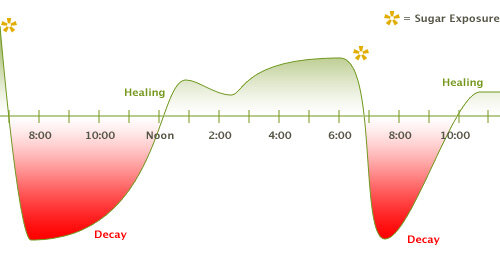Diet for a Cavity-Free Mouth
Tooth decay is a relatively new disease due to excessive and regular sugar consumption. Sugar can lead to obesity, diabetes, heart disease, strokes and… it’s the main culprit in tooth decay.
According to the World Health Organization, we shouldn’t eat more than 50g per day of total sugars, ideally 25g which works out to 10kg per year. At this level you really don’t get decay, and diabetes and obesity are way down too, but not everyone can get this low.
Primitive people didn’t get decay, until they started adding lots of carbohydrates into their diet a few thousand years ago. In the last century, sugar consumption has gone through the roof. 100 years ago most North Americans ate about 2kg a year. Now it’s up to 75 kg a year – adults eat their entire body weight in sugar, and proportionally more for kids! It’s cheap, tasty, addictive, and the food industry puts it into a surprising number of foods and drinks.
Here’s how decay works. Everybody has bacteria (germs) in their mouths. Decay happens when certain types of these germs turn sugar into acid. This acid causes decay. The good guy is your saliva. The saliva neutralizes the acid produced by the germs. It takes 2 hours after consuming anything with sugar for your teeth to stop dissolving. So, your teeth are dissolving for two hours after you have anything with sugar. If you have two meals a day with sweets and nothing in between, your teeth dissolve for four hours a day. Most people seem to cope OK with this.
Every sugary snack between meals adds an extra two hours to your dissolving time. Count up how many meals, snacks, or drinks with sugar you have a day and multiply by two: That’s how much of the day your teeth spend decaying. If it’s 10 hours or more, you may as well reserve a seat in our chair for lots of fillings.
Some people take much longer than others to neutralize the acid, and these folks need to be extra careful as they are much more cavity-prone than others (see above graph). See our Cavity Prevention page for the extra protection and treatments we can use.
Public enemy number one, the sugary snacks are the obvious ones like candies, lozenges, cookies and cakes, but this also includes drinks with sugar such as soft drinks, fruit juice, coffee or tea with sugar. Did you know that a large McDonalds Coke has 22 teaspoons of sugar? It’s full of acid too, which really wrecks the teeth. A cup of juice is healthier, but still has 6-8 teaspoons. It has all the sugar and acid from the 6-8 fruits it was made from. Full-strength juice isn’t particularly healthy.
Here is an interesting link showing the amount of sugar in various drinks: Sugar in Drinks
The worst snacks are those you suck on for a long time, especially sour candies which have built-in acid. Things that stick to your teeth or get jammed between are dangerous too. Even “healthy” snacks like granola bars and dried fruit are loaded with sugar, and are even stickier than some candy. Watch out for hidden junk food like Gummy Vitamins, Vitamin Water etc. Before all you chocoholics jump out the window, there is a simple solution. If you can’t cut the sugar way down, at least for your teeth all you have to do is bundle up all your snacks and juice and include them with the three major meals. Presto! No more decay. (See the first graph, above)
If you must gobble or nibble between meals some things are OK. Nuts, most dairy products, fresh fruit (not dried) and vegetables are fine to have as snacks. Meat, cheese and the like are good too. You can drink water, milk, coffee or tea unsweetened or with sugar substitute (Stevia or Xylitol in moderation) , and watered-down juices in moderation. Juice with soda water tastes good, and has a lot less sugar and calories. There are fruit and berry flavoured herbal teas available that make good iced tea without any sugar. Diet soft drinks contain artificial sweeteners and acid which can damage your teeth and have other health problems, so use great caution with them. Stevia is considered the safest artificial sweetener right now, and Xylitol is not bad in moderation. Some sugarless gums sweetened with Xylitol can actually reduce decay.
It sounds easy and it is. The rest is up to you. With thanks to Dr. Brett Taylor, Sydney, Australia, for his assistance.



